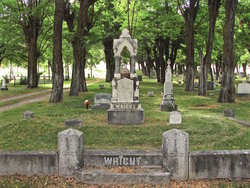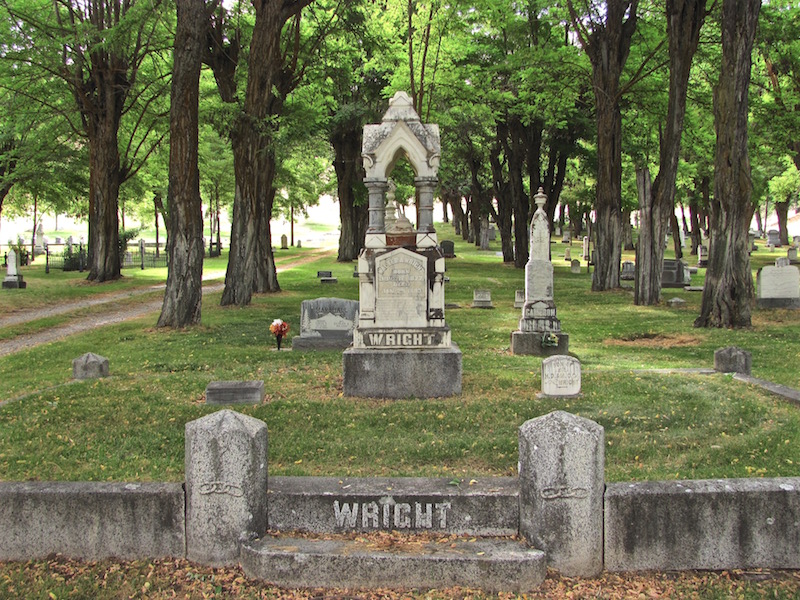Henry's middle name was his mother's maiden name, and both are found with several spelling variations. In the Great Registers of 1879, 1888 and 1892, it was spelled Donohoe, Donahoe and Donahue, respectively. Another variation is Donohue and some sources suggest Donoho.
Although Henry's obituary stated he was born in Smith County, Tennessee, Federal Censuses (with the exception of 1850) and the Great Registers consistently indicated that he was born in Illinois. This is supported by other documentation, including his father's obituary, which reported that the family (who had previously lived in Smith County, Tennessee) left Hopkins County, Kentucky, in 1833 and arrived in Hancock County, Illinois, in March of that year. They settled in a township that wouldn't have a name until 1850.
Henry left his father's home around 1852 in the company of one or more of his brothers, joining the throngs headed for the gold fields. He married, raised his family and spent the rest of his life in Siskiyou County.
The Quill, La Harpe, Hancock County, Illinois, page 1
Tuesday, November 22, 1904
Henry Wright, of Fort Jones, California, came to LaHarpe last Thursday from Galesburg, and was met here by his nephew, Doug. Wright, of Webster. The gentleman is a placer miner and has been following that vocation in the West ever since 1852. He left here in that year and first located at Yreka, Siskiyou county, California. He is quite an interesting talker and despite his age is a strong and robust man. He was called back by the death of his brother, Seneca M. Wright, who died at Webster recently. He got here a short time before he passed away.
Unknown original newspaper.
PASSING OF HENRY D. WRIGHT
Pioneer and Prominent Man of Scott Valley Joins the Host Beyond the Vail
Henry D. Wright was born in Smith county, Tennessee, on July 27, 1834. His boyhood was spent working on his father's farm. Early in life he manifested an adventuresome spirit, and when but nineteen years of age he bade adieu to his home and friends and in company with two brothers crossed the plains to California in search of fortune. After a journey of over four months they landed at Placerville on August 7, 1853. Like most of those early pioneers he engaged in mining in that vicinity for two years, when he came to Siskiyou county where he has lived ever since until his death, which took place on the 11th inst. His first venture in mining was at Scott Bar where he worked until 1857 when he removed to Scott valley and settled in Oro Fino, and finally secured the famous Wright & Fletcher placer mine. During the early times this ground was worked by drifting where it was too deep for picking and shoveling; but in later years ditches were constructed at great expense and the water brought to Oro Fino from the Salmon mountains and the claim fitted up with elevators, giants and all of the late improved machinery and made to yield an immense amount of the precious dust. He was married to Miss Mary C. Wood, a daughter of J. P. Wood, one of the early pioneers of Scott valley, on the thirtieth day of December, 1872. The union was a happy one until her death which occurred on March 14, 1906. Four children were born to them, three of whom, Charles H. Wright, Miss Grace G. Wright and George P. Wright, are living to mourn his death, Walter A. Wright having died in 1877 [error]. He was of a family of eleven children. Two brothers, S. A. Wright and C. G. Wright, and one sister, Mrs. Cynthia Willey, all of Hancock co., Illinois, survive him.
For more than twenty-four years Mr. Wright was a highly respected member of Fort Jones Lodge No. 115 and Scott Valley Encampment No. 63, I. O. O. F. His health began to decline some two years ago when he gave up active life, his farm and mine being managed by his two sons and his home by his daughter. It was not until some two months ago that he kept his house and finally his cot by the fire. He bore his sickness with that same heroic spirit that had marked his life, and met his end unflinchingly.
Henry D. Wright was a true type of the western frontiersman. He possessed a strong frame and was endowed with a brave and driving spirit, but has a heart as tender and sympathetic as that of a child. It would require columns to relate the many kind and generous things he did in life, but one would suffice to show his warm heart and generous nature, the tender, fatherly care and love he manifested towards the little girl to whom he gave a home and loved her as his own. - indeed if there was a true type of "Capt. January" it was he. He was a true friend and neighbor, a generous and loving husband and father and an honest man.
His funeral took place on the 14th from the Odd Fellow's Hall under the auspices of Fort Jones Lodge No. 115, I. O. O. F., and although the day was cold and dreary it was largely attended by his friends and neighbors. A touching sermon was preached by the Rev. Mrs. Luce of Etna. He remains were followed to the cemetery by a large concourse of brothers and _________ and laid to rest beside those ______fe and son, and from many a _________ prayer went that his soul ________ace.
Henry's middle name was his mother's maiden name, and both are found with several spelling variations. In the Great Registers of 1879, 1888 and 1892, it was spelled Donohoe, Donahoe and Donahue, respectively. Another variation is Donohue and some sources suggest Donoho.
Although Henry's obituary stated he was born in Smith County, Tennessee, Federal Censuses (with the exception of 1850) and the Great Registers consistently indicated that he was born in Illinois. This is supported by other documentation, including his father's obituary, which reported that the family (who had previously lived in Smith County, Tennessee) left Hopkins County, Kentucky, in 1833 and arrived in Hancock County, Illinois, in March of that year. They settled in a township that wouldn't have a name until 1850.
Henry left his father's home around 1852 in the company of one or more of his brothers, joining the throngs headed for the gold fields. He married, raised his family and spent the rest of his life in Siskiyou County.
The Quill, La Harpe, Hancock County, Illinois, page 1
Tuesday, November 22, 1904
Henry Wright, of Fort Jones, California, came to LaHarpe last Thursday from Galesburg, and was met here by his nephew, Doug. Wright, of Webster. The gentleman is a placer miner and has been following that vocation in the West ever since 1852. He left here in that year and first located at Yreka, Siskiyou county, California. He is quite an interesting talker and despite his age is a strong and robust man. He was called back by the death of his brother, Seneca M. Wright, who died at Webster recently. He got here a short time before he passed away.
Unknown original newspaper.
PASSING OF HENRY D. WRIGHT
Pioneer and Prominent Man of Scott Valley Joins the Host Beyond the Vail
Henry D. Wright was born in Smith county, Tennessee, on July 27, 1834. His boyhood was spent working on his father's farm. Early in life he manifested an adventuresome spirit, and when but nineteen years of age he bade adieu to his home and friends and in company with two brothers crossed the plains to California in search of fortune. After a journey of over four months they landed at Placerville on August 7, 1853. Like most of those early pioneers he engaged in mining in that vicinity for two years, when he came to Siskiyou county where he has lived ever since until his death, which took place on the 11th inst. His first venture in mining was at Scott Bar where he worked until 1857 when he removed to Scott valley and settled in Oro Fino, and finally secured the famous Wright & Fletcher placer mine. During the early times this ground was worked by drifting where it was too deep for picking and shoveling; but in later years ditches were constructed at great expense and the water brought to Oro Fino from the Salmon mountains and the claim fitted up with elevators, giants and all of the late improved machinery and made to yield an immense amount of the precious dust. He was married to Miss Mary C. Wood, a daughter of J. P. Wood, one of the early pioneers of Scott valley, on the thirtieth day of December, 1872. The union was a happy one until her death which occurred on March 14, 1906. Four children were born to them, three of whom, Charles H. Wright, Miss Grace G. Wright and George P. Wright, are living to mourn his death, Walter A. Wright having died in 1877 [error]. He was of a family of eleven children. Two brothers, S. A. Wright and C. G. Wright, and one sister, Mrs. Cynthia Willey, all of Hancock co., Illinois, survive him.
For more than twenty-four years Mr. Wright was a highly respected member of Fort Jones Lodge No. 115 and Scott Valley Encampment No. 63, I. O. O. F. His health began to decline some two years ago when he gave up active life, his farm and mine being managed by his two sons and his home by his daughter. It was not until some two months ago that he kept his house and finally his cot by the fire. He bore his sickness with that same heroic spirit that had marked his life, and met his end unflinchingly.
Henry D. Wright was a true type of the western frontiersman. He possessed a strong frame and was endowed with a brave and driving spirit, but has a heart as tender and sympathetic as that of a child. It would require columns to relate the many kind and generous things he did in life, but one would suffice to show his warm heart and generous nature, the tender, fatherly care and love he manifested towards the little girl to whom he gave a home and loved her as his own. - indeed if there was a true type of "Capt. January" it was he. He was a true friend and neighbor, a generous and loving husband and father and an honest man.
His funeral took place on the 14th from the Odd Fellow's Hall under the auspices of Fort Jones Lodge No. 115, I. O. O. F., and although the day was cold and dreary it was largely attended by his friends and neighbors. A touching sermon was preached by the Rev. Mrs. Luce of Etna. He remains were followed to the cemetery by a large concourse of brothers and _________ and laid to rest beside those ______fe and son, and from many a _________ prayer went that his soul ________ace.
Family Members
-
![]()
Arzilla Wright Ward
1822–1908
-
![]()
Seborn Alexander Wright
1824–1912
-
![]()
Seneca Marcus Wright
1826–1901
-
![]()
Martha E. Wright Stahl
1828–1904
-
![]()
Patrick W. Wright
1830–1905
-
![]()
James Basil Wright
1832–1850
-
![]()
Thomas Goldman Wright
1836–1896
-
![]()
Charles Garland Wright
1840–1923
-
![]()
Cynthia A. Wright Willey
1844–1913
-
![]()
Infant Son Wright
unknown–1842
Sponsored by Ancestry
Advertisement
Records on Ancestry
Advertisement























